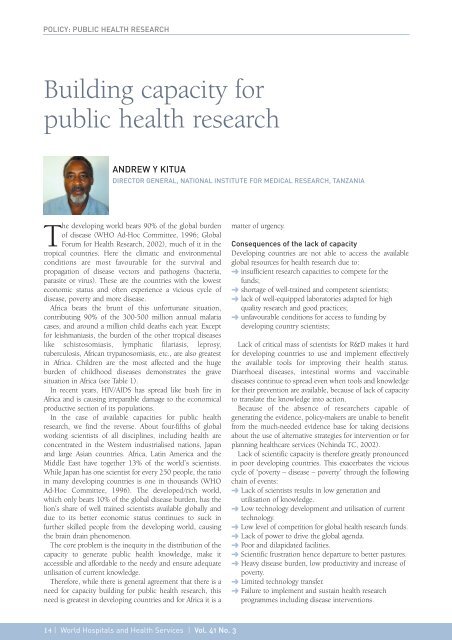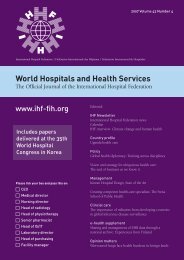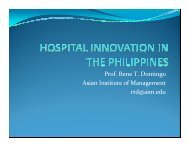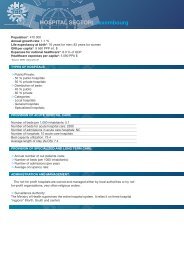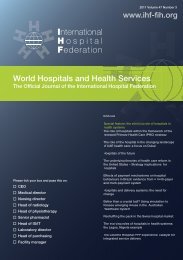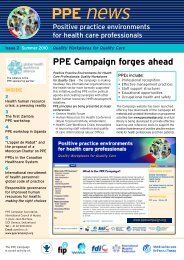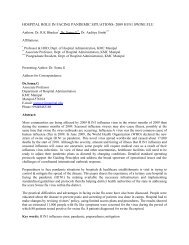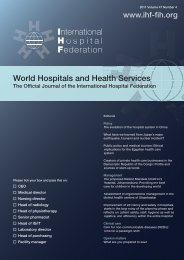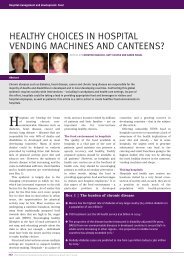World Hospitals and Health Services - International Hospital ...
World Hospitals and Health Services - International Hospital ...
World Hospitals and Health Services - International Hospital ...
You also want an ePaper? Increase the reach of your titles
YUMPU automatically turns print PDFs into web optimized ePapers that Google loves.
POLICY: PUBLIC HEALTH RESEARCH<br />
Building capacity for<br />
public health research<br />
ANDREW Y KITUA<br />
DIRECTOR GENERAL, NATIONAL INSTITUTE FOR MEDICAL RESEARCH, TANZANIA<br />
The developing world bears 90% of the global burden<br />
of disease (WHO Ad-Hoc Committee, 1996; Global<br />
Forum for <strong>Health</strong> Research, 2002), much of it in the<br />
tropical countries. Here the climatic <strong>and</strong> environmental<br />
conditions are most favourable for the survival <strong>and</strong><br />
propagation of disease vectors <strong>and</strong> pathogens (bacteria,<br />
parasite or virus). These are the countries with the lowest<br />
economic status <strong>and</strong> often experience a vicious cycle of<br />
disease, poverty <strong>and</strong> more disease.<br />
Africa bears the brunt of this unfortunate situation,<br />
contributing 90% of the 300-500 million annual malaria<br />
cases, <strong>and</strong> around a million child deaths each year. Except<br />
for leishmaniasis, the burden of the other tropical diseases<br />
like schistosomiasis, lymphatic filariasis, leprosy,<br />
tuberculosis, African trypanosomiasis, etc., are also greatest<br />
in Africa. Children are the most affected <strong>and</strong> the huge<br />
burden of childhood diseases demonstrates the grave<br />
situation in Africa (see Table 1).<br />
In recent years, HIV/AIDS has spread like bush fire in<br />
Africa <strong>and</strong> is causing irreparable damage to the economical<br />
productive section of its populations.<br />
In the case of available capacities for public health<br />
research, we find the reverse. About four-fifths of global<br />
working scientists of all disciplines, including health are<br />
concentrated in the Western industrialised nations, Japan<br />
<strong>and</strong> large Asian countries. Africa, Latin America <strong>and</strong> the<br />
Middle East have together 13% of the world’s scientists.<br />
While Japan has one scientist for every 250 people, the ratio<br />
in many developing countries is one in thous<strong>and</strong>s (WHO<br />
Ad-Hoc Committee, 1996). The developed/rich world,<br />
which only bears 10% of the global disease burden, has the<br />
lion’s share of well trained scientists available globally <strong>and</strong><br />
due to its better economic status continues to suck in<br />
further skilled people from the developing world, causing<br />
the brain drain phenomenon.<br />
The core problem is the inequity in the distribution of the<br />
capacity to generate public health knowledge, make it<br />
accessible <strong>and</strong> affordable to the needy <strong>and</strong> ensure adequate<br />
utilisation of current knowledge.<br />
Therefore, while there is general agreement that there is a<br />
need for capacity building for public health research, this<br />
need is greatest in developing countries <strong>and</strong> for Africa it is a<br />
matter of urgency.<br />
Consequences of the lack of capacity<br />
Developing countries are not able to access the available<br />
global resources for health research due to:<br />
➜ insufficient research capacities to compete for the<br />
funds;<br />
➜ shortage of well-trained <strong>and</strong> competent scientists;<br />
➜ lack of well-equipped laboratories adapted for high<br />
quality research <strong>and</strong> good practices;<br />
➜ unfavourable conditions for access to funding by<br />
developing country scientists;<br />
Lack of critical mass of scientists for R&D makes it hard<br />
for developing countries to use <strong>and</strong> implement effectively<br />
the available tools for improving their health status.<br />
Diarrhoeal diseases, intestinal worms <strong>and</strong> vaccinable<br />
diseases continue to spread even when tools <strong>and</strong> knowledge<br />
for their prevention are available, because of lack of capacity<br />
to translate the knowledge into action.<br />
Because of the absence of researchers capable of<br />
generating the evidence, policy-makers are unable to benefit<br />
from the much-needed evidence base for taking decisions<br />
about the use of alternative strategies for intervention or for<br />
planning healthcare services (Nchinda TC, 2002).<br />
Lack of scientific capacity is therefore greatly pronounced<br />
in poor developing countries. This exacerbates the vicious<br />
cycle of ‘poverty – disease – poverty’ through the following<br />
chain of events:<br />
➜ Lack of scientists results in low generation <strong>and</strong><br />
utilisation of knowledge.<br />
➜ Low technology development <strong>and</strong> utilisation of current<br />
technology.<br />
➜ Low level of competition for global health research funds.<br />
➜ Lack of power to drive the global agenda.<br />
➜ Poor <strong>and</strong> dilapidated facilities.<br />
➜ Scientific frustration hence departure to better pastures.<br />
➜ Heavy disease burden, low productivity <strong>and</strong> increase of<br />
poverty.<br />
➜ Limited technology transfer.<br />
➜ Failure to implement <strong>and</strong> sustain health research<br />
programmes including disease interventions.<br />
14 | <strong>World</strong> <strong><strong>Hospital</strong>s</strong> <strong>and</strong> <strong>Health</strong> <strong>Services</strong> | Vol. 41 No. 3


